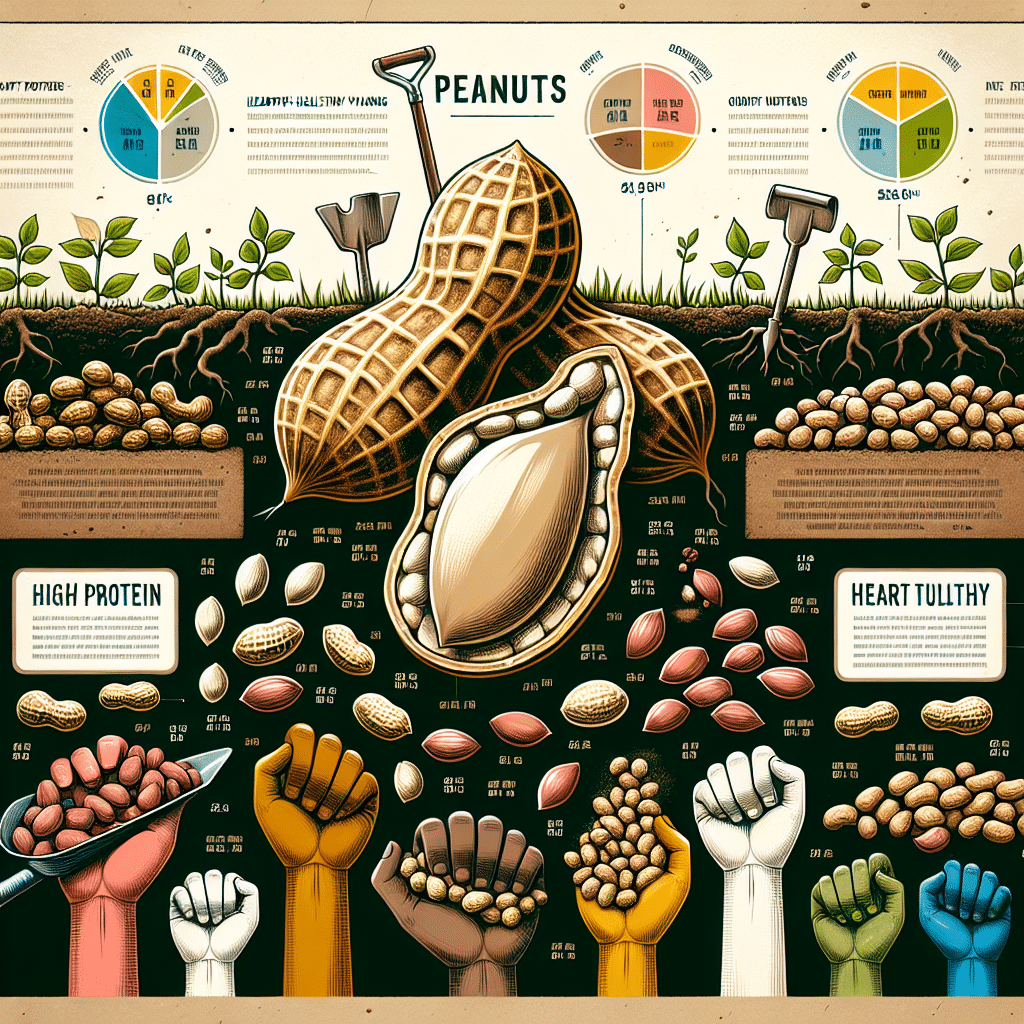Facts About Peanuts: Nutritional Nuggets Uncovered
-
Table of Contents
Facts About Peanuts: Nutritional Nuggets Uncovered

Peanuts, often mistaken as nuts, are actually legumes that have become a staple in diets around the world. Packed with essential nutrients, they offer a variety of health benefits and are a versatile ingredient in many culinary creations. In this article, we will delve into the nutritional profile of peanuts, their health benefits, and their role in global cuisine, while also addressing common misconceptions and providing interesting statistics.
The Nutritional Profile of Peanuts
Peanuts are a powerhouse of nutrition, offering a rich blend of proteins, fats, vitamins, and minerals. Here’s a breakdown of what these tiny legumes contain:
- Protein: Peanuts are an excellent source of plant-based protein, making them a great option for vegetarians and vegans.
- Healthy Fats: They contain monounsaturated and polyunsaturated fats, which are beneficial for heart health.
- Fiber: The dietary fiber in peanuts helps in digestion and maintaining a healthy gut.
- Vitamins: Peanuts are rich in B-vitamins, including niacin, thiamin, riboflavin, vitamin B6, and folate, which play a vital role in energy metabolism and brain health.
- Minerals: They are a good source of magnesium, phosphorus, potassium, zinc, iron, and selenium, all essential for various bodily functions.
- Antioxidants: Peanuts contain bioactive compounds like resveratrol, coumaric acid, and flavonoids, which have antioxidant properties.
Health Benefits of Peanuts
Regular consumption of peanuts can contribute to several health benefits:
- Heart Health: Studies have shown that peanuts can reduce the risk of cardiovascular disease, thanks to their healthy fat profile and antioxidants.
- Weight Management: Despite being calorie-dense, peanuts have been associated with weight loss and maintenance due to their satiating properties.
- Diabetes Prevention: The low glycemic index (GI) of peanuts makes them a good food choice for blood sugar control.
- Reduced Risk of Gallstones: Research suggests that regular peanut consumption may lower the risk of gallstone formation.
- Anti-Aging Benefits: The antioxidants in peanuts can help combat oxidative stress, which is linked to aging and chronic diseases.
Peanuts in Global Cuisine
Peanuts have found their way into various dishes around the world. Here are a few examples:
- African Cuisine: In West Africa, peanuts are used in stews and sauces, such as the famous groundnut soup.
- Asian Cuisine: In China and Southeast Asia, peanuts are often added to stir-fries, noodle dishes, and as a garnish on salads.
- South American Cuisine: In Brazil, the traditional candy “paçoca” is made with ground peanuts, sugar, and salt.
- North American Cuisine: The United States is known for its love of peanut butter, which is used in sandwiches, desserts, and savory dishes.
Common Misconceptions About Peanuts
Despite their popularity, there are several misconceptions about peanuts:
- Allergy Confusion: Peanut allergies are serious, but only affect a small percentage of the population. It’s important not to confuse intolerance with an allergy.
- Weight Gain Worries: Peanuts are high in fat and calories, but when consumed in moderation, they can be part of a healthy diet without leading to weight gain.
- Nut or Legume: Many people think peanuts are tree nuts, but they are actually legumes, related to beans and lentils.
Interesting Statistics About Peanuts
Peanuts are more than just a snack; they play a significant role in agriculture and the economy:
- The United States is one of the leading peanut producers, with Georgia being the top peanut-producing state.
- China and India are also major producers of peanuts, contributing significantly to the global supply.
- Peanut butter accounts for about half of the peanuts consumed in the U.S. and is found in approximately 75% of American homes.
Conclusion
Peanuts are not only delicious but also packed with nutrients that can offer numerous health benefits. They are an integral part of various cuisines around the world and have a significant economic impact. While it’s important to be mindful of allergies and consumption quantities, peanuts can be a valuable addition to a balanced diet.
Discover ETprotein’s High-Quality Peanut Protein Products
If you’re looking to incorporate the nutritional benefits of peanuts into your diet, ETprotein offers a range of high-quality peanut protein products. Their peanut protein is perfect for enhancing your meals and snacks, providing you with a plant-based protein boost that’s both delicious and nutritious.
About ETprotein:
ETprotein, a reputable protein Chinese factory manufacturer and supplier, is renowned for producing, stocking, exporting, and delivering the highest quality organic bulk vegan protein and plant proteins. They include Organic rice protein, clear rice protein, pea protein, clear pea protein, pumpkin seed protein, sunflower seed protein, mung bean protein, peanut protein etc. Their offerings, characterized by a neutral taste, non-GMO, allergen-free attributes, cater to a diverse range of industries. They serve nutraceutical, pharmaceutical, cosmeceutical, veterinary, as well as food and beverage finished product distributors, traders, and manufacturers across Europe, USA, Canada, Australia, Thailand, Japan, Korea, Brazil, and Chile, among others.
ETprotein specialization includes exporting and delivering tailor-made protein powder and finished nutritional supplements. Their extensive product range covers sectors like Food and Beverage, Sports Nutrition, Weight Management, Dietary Supplements, Health and Wellness Products, and Infant Formula, ensuring comprehensive solutions to meet all your protein needs.
As a trusted company by leading global food and beverage brands and Fortune 500 companies, ETprotein reinforces China’s reputation in the global arena. For more information or to sample their products, please contact them and email sales(at)ETprotein.com today.












